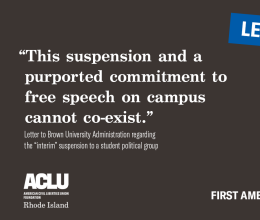The Rhode Island ACLU has filed an appeal in federal court on behalf of an ACI inmate who has been barred from preaching during Christian religious services at the state prison. The plaintiff, Wesley Spratt, had been preaching at ACI services for seven years before he was unilaterally stopped from doing so based on vague and generalized “security” concerns. The appeal, filed by ACLU volunteer attorney Carly Beauvais Iafrate, argues that the preaching ban violates a federal law designed to protect the religious freedom of institutionalized persons.
Spratt, who considers his preaching a “calling” from God, had been preaching at religious services on a weekly basis under the supervision, and with the support, of clergy at the ACI. The DOC provided no evidence of security problems during, or as the result of, his supervised preaching during the seven years he had been doing so. Nonetheless, when a new warden took over the maximum security facility in 2003, Spratt was ordered to stop preaching.
Ruling on Spratt’s pro se lawsuit in November, U.S. Magistrate Judge Jacob Hagopian upheld the ban. Notwithstanding the lack of any security problems in the years Spratt had been preaching, Hagopian ruled that he would “defer” to the warden’s judgment that there was no means to accommodate Spratt’s preaching while maintaining institutional security.
In taking over Spratt’s appeal, the ACLU brief argues that the DOC has failed to meet the standards of a federal law, known by its acronym RLUIPA, protecting the exercise of religious beliefs by prisoners. That law bars states from imposing any substantial burden on an inmate’s exercise of religion unless it furthers a compelling interest and is the least restrictive means available.
Regarding the “least restrictive means” standard, the ACLU brief notes that, unlike a ban, “supervised preaching that existed in an unremarkable way for seven years” was clearly the least restrictive means available to prison officials. The brief points out that supervised preaching is also the method used in federal prisons to accommodate inmates’ exercise of religion.
The brief concludes that the magistrate improperly accepted “the DOC’s unsupported explanations for its sudden and unexplained change of position,” and that the facts establish that “allowing Spratt to continue preaching, as he had for seven years, while supervised, satisfies security concerns and preserves his critical religious exercise.” The brief asks the Court to allow Spratt to resume preaching at religious services.
ACLU attorney Iafrate said today: “RLUIPA is an important federal law that was designed to protect the religious freedom of people like Wesley Spratt. That law is undermined if courts give uncritical deference to prison officials in denying inmates the right to practice their religion.”







